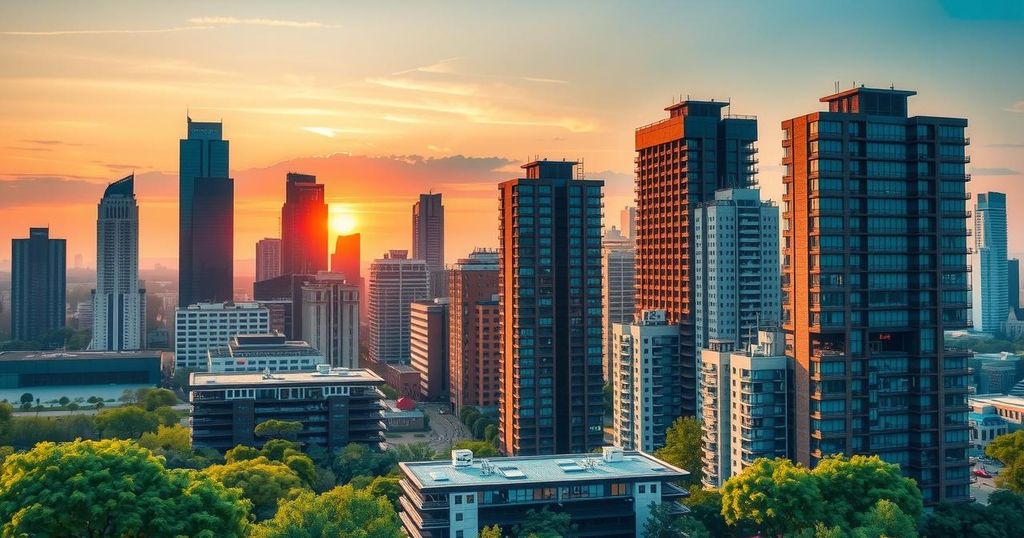Johannesburg’s Transformation: From Crime Hub to Thriving City
Johannesburg is experiencing a revival, transitioning from a notorious crime hub to a revitalized urban center. Ponte Tower, once plagued by crime, now stands largely occupied. New developments like Jewel City cater to increasing urban demand, while initiatives like JoziMyJozi aim to enhance safety and community life. The city seeks to reshape its global perception, aspiring to be recognized alongside major international cities.
Johannesburg continues to transform from a former crime-ridden city to a vibrant urban center. Iconic structures like Ponte Tower have risen from the ashes of neglect, recovering from a decline marked by criminal activity and disarray during the 1980s. Delight Sithole, a tour guide, recalls the building’s dark past, stating, “The building got hijacked. There were no utilities, so most of the people were actually throwing their trash right inside the building, until it reached the 14th floor.”
Today, Ponte Tower is largely populated once again, with about seventy-five percent of its units occupied, reflecting the city’s resurgence following the 2010 FIFA World Cup. Despite ongoing challenges such as crime and infrastructure issues, efforts are underway to revitalize the Central Business District. Property developments like Jewel City represent significant investment in the area, with demand for urban living notably increasing.
Alan Tait from Ithemba, a construction company with a focus on urban renewal, cites exceptional demand for units in Jewel City and similar projects. Tait observes that the area, historically associated with diamond trading, is experiencing a resurgence. With plans to double property leases in coming years, Ithemba is spearheading a wave of reinvigoration.
Various initiatives focused on community upliftment, such as JoziMyJozi, aim to illuminate the city’s streets, enhancing safety and access. CEO Bea Swanepoel emphasizes the importance of visible improvements to instill hope among residents. “By bringing hope back, we need to show some visible improvements and impactful projects so that they can see there’s a way out of where we are currently,” Swanepoel remarks.
As Johannesburg prepares to host the G20, there is bullish optimism regarding its potential future. Efforts to clean up the city and foster safety could change perceptions and elevate its status on a global scale. With strategic planning and community involvement, leaders believe Johannesburg can be positioned among world-class cities such as London, Paris, and New York.
Sifiso Zikhali, representing the organization Dlala Nje, expresses confidence in their efforts at community engagement and city attraction. “This is our city, and whatever we face, we need at the end to find a solution for it,” he states, reflecting a commitment to ongoing improvement and revitalization.
Johannesburg has long battled a reputation for high crime rates and urban decay. Historically, it has experienced significant upheaval, particularly in the 1980s with rising gang violence and neglect of structures like Ponte Tower. The city has nonetheless embarked on a transformation journey, especially post-2010 FIFA World Cup, aiming to attract residents and investors back to its urban core.
Johannesburg is undergoing a significant revival, particularly illustrated by the transformation of Ponte Tower and the development of Jewel City. Despite challenges, including crime and infrastructure issues, there is a concerted effort to improve safety and uplift communities. The city’s aspirations to be viewed alongside global metropolises depends on continued investment and community engagement as it prepares to host the G20.
Original Source: www.bbc.co.uk




Post Comment